Five Ways to Wellbeing
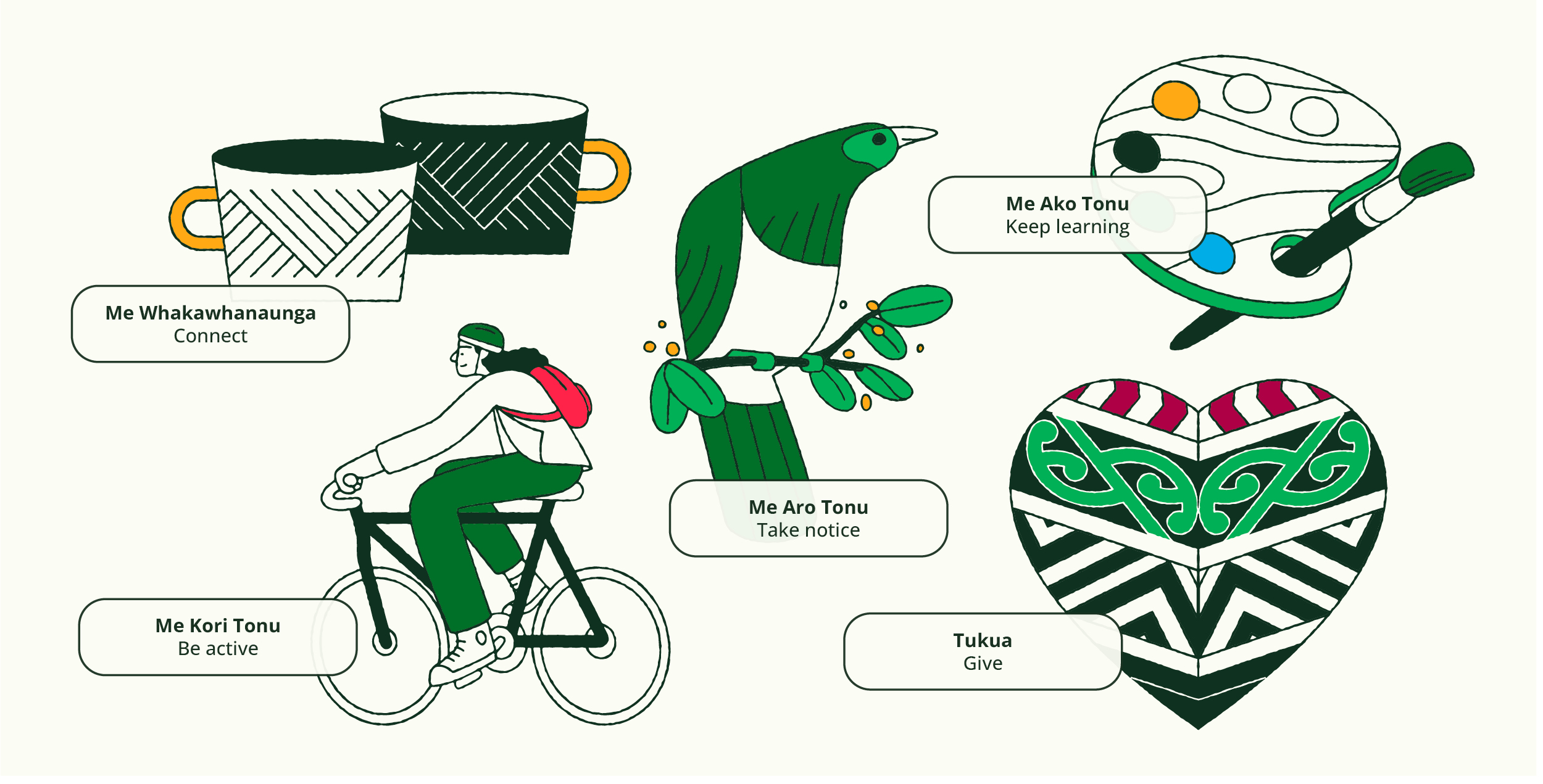
If you’re looking for practical things you can start doing straight away to feel good and boost your wellbeing, a model that focuses on five simple categories might be just what you need.
The Five Ways to Wellbeing were developed by the New Economics Foundation (NEF) and have been used around the world by people, communities and organisations looking for simple ways to improve mental health and wellbeing.
The Five Ways (Connect, Be Active, Keep Learning, Take Notice and Give) are small but meaningful actions you can do over and over again, adapting them to suit your unique values, interests and lives. They might seem simple, but their impact can really add up.
Try to weave them into each day and see how you feel after a week or two – you might be surprised by the results!
Connect | Me whakawhanaunga
Connecting with the people around you, in person, online or over the phone, is important for your mental health. It will not only make you feel happier, it will help you feel you are important and belong, and it can help you stay mentally and emotionally well.
It’s not always easy to connect with others, especially if you’re busy, studying while you work, caring for whānau or have other responsibilities. What are some small things you could do to connect with others?
- Check in with someone who seems lonely or isolated and invite them to sit with you
- Send a message to someone you haven't spoken to in a while and let them know you’re thinking of them
- Organise a potluck dinner or shared lunch with your whānau, friends, ākonga or workmates
- Organise or join study groups or group chats with friends from the same course
- Call or visit older whānau or friends just because you’re thinking of them
- Say 'kia ora' with a smile to bus drivers, café staff, everyone you meet
- Stop and ask "how are you/kei te pēhea koe?" when you’re talking to someone – a small question like that can make a big difference in someone’s day
- Join a club or group.
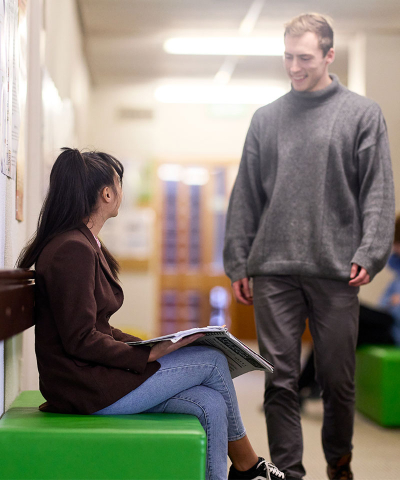
"I try to be friendly to everyone. The people who want to connect will meet you in that space as well. I've made some really good friends through my studies."
Be Active | Me kori tonu
Moving your body shifts your mood, so move your body in ways that feel good to you. It’s about doing what you can and making it enjoyable for your body and your life.
Regular exercise doesn’t just make you feel good, it can also reduce feelings of depression or anxiety. It can give you a sense of control and the mental strength you need to get through challenging times. It can also be a great way to ease stress.
Finding activities you genuinely enjoy is key – being active shouldn’t feel like a punishment and it shouldn’t cause you pain. What types of movement do you enjoy? How do you feel afterwards? Are there small things you could do a bit more often?
- Have mini dance breaks in your chair between lectures.
- Head out into the fresh air and stretch.
- Get off the train/bus one stop early and walk the rest of the way.
- Find a free relaxation yoga class on YouTube at the end of the day.
- Hit the gym with mates.
- Go to the beach or park for a walk.
- Lift some weights at your desk.
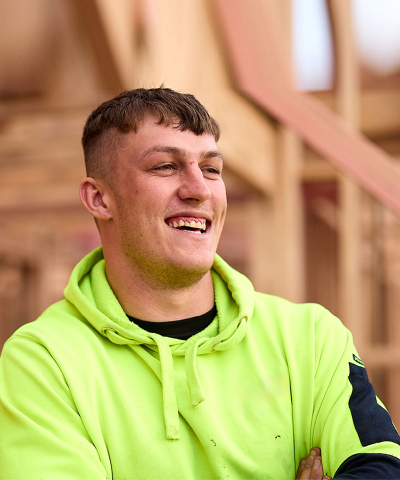
“I'm quite a sporty guy, I like getting out, whether it's training or going for a run. It really helps me escape from everything else that's going on.”
Keep learning | Me ako tonu
Being a life-long learner is great for self-esteem and self-confidence and helps give a sense of purpose. As an ākonga (learner), you might be feeling like you’ve got this one sorted, but as well as formal learning it’s also about being curious and open to new experiences.
What opportunities do you have to try something new outside of work/study? What are you really interested in?
- Take the chance to learn te reo while you’re studying or even just try to learn one new word/phrase a week.
- Spotted something around the whare that needs fixing? Here’s your chance for some DIY! There are heaps of tutorials on YouTube – have a go!
- Try out a new recipe and share the kai with your whānau, friends or hoamahi (workmates).
- Read a book or watch a documentary on a topic that interests you.
- Have a chat with tamariki about what they’re learning at school – you might be surprised at what you learn, too.
- Do an online news quiz.
- Visit your local marae and learn about its history.
- Take on a new responsibility at mahi.
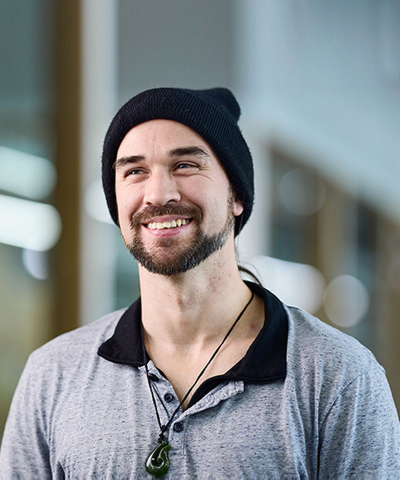
“I think being a learner is important; we should always be learning things and always improving ourselves to be the best we can be.”
Take notice | Me aro tonu
Being ‘in the moment’ is another way of saying you’re not distracted, you’re aware of your surroundings and how you’re feeling. Taking notice is important for our wellbeing and mental health because it helps us understand what situations make us feel good, happy and comfortable, and what situations make us feel anxious, unhappy and stressed, and to make good choices. It’s also important because being genuinely present instead of worrying or thinking ahead is good for us – it helps us feel happier about our lives as they are now.
How are you feeling right now? What do you notice about the room or place you’re in? What can you see? What can you hear?
- Visit places that are important to you and pay attention to how they look, how they smell, how they sound.
- Listen to some music – an old favourite, something new to you, and pay attention to how it makes you feel.
- Pay attention to small kindnesses and thank people when you notice them.
- Every morning, think of one thing you are grateful for and say it out loud or write it down.
- Learn about the stars and constellations and look up into the sky and see how many you can spot.
- Do some meditation exercises – there are free ones on YouTube.
- Spend time in nature listening to birds, watching the sea, smelling the earth. Climb your maunga, swim in your awa or moana.
- Sing waiata, recite karakia, notice how it makes you feel.
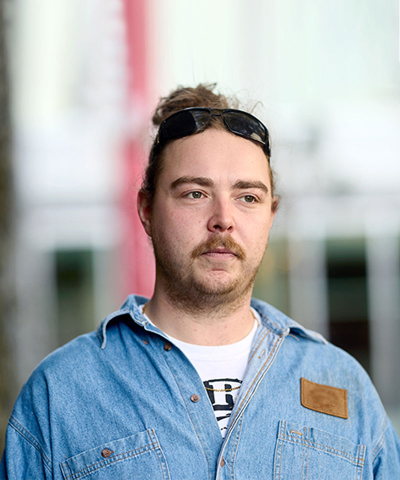
“Music is a really important part of my wellbeing. Listening to music helps me relax when I'm studying. It just helps give me a bit of zen and centres me.”
Give | Tukua
Giving is about kindness, not about giving money. It’s about thinking of others, of their needs and how we can help. Sharing what you have, whether it’s skills, time or resources, makes you feel good, strengthens your wellbeing and can help you feel more connected.
If you’re feeling stretched, it might seem like a big ask – to give to others when you don’t feel like you’ve got much left in the tank. Don’t give more than you have, but giving feels good, and helps boost and lift you up, too. It’s a generous way of looking after yourself, improving your mood and making you feel less stressed. What are some ways you could find to be kind or helpful to others?
- Sign up to volunteer for a cause that inspires you
- Make a cuppa for someone else
- Give a sincere compliment
- Offer help to another learner
- Introduce yourself to new people
- Let other cars in ahead of you when you’re driving
- Offer to help a mate with a DIY project
- Publicly praise a peer or colleague when they do great work on a project
- Do more than your share of chores around the house if you see a member of your whānau is struggling and could use a bit of extra awhi.
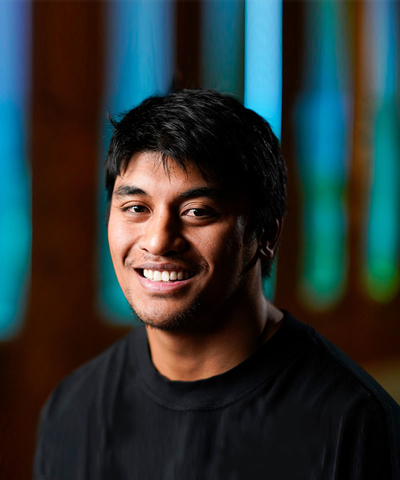
“When I’m kind to others, I feel like I’ve done my job as a human being.”
* The Five Ways to Wellbeing were brought to New Zealand by the Mental Health Foundation of New Zealand, who also arranged for the Five Ways to be translated into te reo Māori.





